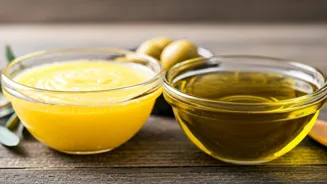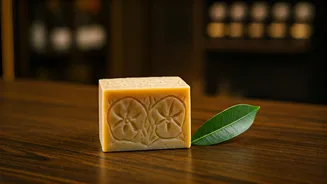Healthy Fats Explained
The quest for a trimmer waistline often involves understanding the role of fats. Contrary to some beliefs, healthy fats can indeed play a crucial role in fat burning.
Both ghee and olive oil, each with distinct compositions, bring their own set of advantages to the table. Ghee, a clarified butter, is rich in conjugated linoleic acid (CLA), known for its potential in reducing fat accumulation. Olive oil, particularly extra virgin olive oil, is loaded with monounsaturated fats and antioxidants, both associated with various health advantages, including weight management. It's important to distinguish between these beneficial fats and the unhealthy ones; choosing the right fats is a key step in achieving a balanced diet and attaining your weight loss aspirations. Including the right fats in your diet can support the body's metabolism and aid in reducing belly fat. Focusing on quality fats alongside other healthy habits is key to weight loss.
Ghee's Weight Loss Potential
Ghee, or clarified butter, has been used for centuries in Indian cooking and is now gaining recognition for its potential role in weight management. One key component of ghee is CLA, which is a naturally occurring fatty acid that has been studied for its ability to support fat reduction. CLA may help by influencing metabolism and possibly aiding in reducing fat storage in the body. When incorporating ghee into your weight loss plan, it's wise to consider the timing of its consumption. Many experts suggest including it in your morning routine or before workouts because the fats help with sustained energy. Always remember that, while ghee has benefits, it's essential to consume it in moderation because of its high-calorie content. It should be part of a balanced diet that includes other nutritious foods, regular exercise, and sufficient hydration. Using ghee the right way can complement your weight loss efforts, offering some benefits to your overall health journey.
Olive Oil's Benefits
Olive oil, especially extra virgin olive oil, is packed with healthy monounsaturated fats, which are a great addition to any diet, including a weight loss one. These fats can promote satiety, helping you feel full for a longer period and making it easier to control your calorie intake. The antioxidants in olive oil, such as polyphenols, contribute to its health benefits by fighting inflammation and supporting overall well-being. Considering olive oil’s role in reducing belly fat, incorporating it into your daily diet can be beneficial. Olive oil's versatility means you can use it in various ways, like in salads, drizzled over vegetables, or used in low-heat cooking. Remember to keep your portion sizes in check, as even healthy fats can contribute to overall calorie intake. Including olive oil in your balanced diet is a smart move towards weight management. The antioxidants in the oil also bring in additional health benefits and support for overall well-being.
Timing Your Oils
When it comes to when to consume ghee and olive oil, timing can affect how they support your weight loss journey. It has been suggested that consuming ghee in the morning, perhaps with your breakfast or before a workout, can provide your body with sustained energy throughout the day. This timing may help you burn more calories. On the other hand, olive oil's benefits for fullness make it a great addition to lunchtime or dinner meals. It is important to note that these are general guidelines, and everyone’s body responds differently. Listening to your body's signals is crucial. Experiment with how you incorporate both oils into your daily diet and pay attention to how it affects your energy levels, digestion, and overall well-being. This way, you can fine-tune your timing to optimize their benefits for your weight management goals. Customizing your oil intake to your daily schedule and preferences is a personalized approach that can lead to better weight loss results.
Which One Is Better?
So, ghee or olive oil for belly fat? The answer isn't straightforward because both oils offer unique benefits. Ghee, with its CLA content, may help in fat reduction, while olive oil, loaded with monounsaturated fats, can help you feel fuller, possibly leading to reduced calorie intake. The ideal choice depends on your personal dietary needs, preferences, and health goals. Consider the bigger picture. Instead of focusing on one oil over the other, the best strategy is to balance both in your diet. This is a simple way to gain the advantages of each. Prioritize a diet filled with other nutrient-rich foods, combine it with regular physical activity, and ensure you get enough sleep. Making choices based on balance and variety can pave the way for long-term success in weight management. Both ghee and olive oil have roles in promoting health and reducing belly fat.
The Balanced Approach
The real secret to weight loss is not just choosing between ghee and olive oil; it's about balance. A holistic approach to weight management combines a balanced diet with a lifestyle that supports health. It’s important to include a variety of nutritious foods, such as fruits, vegetables, lean proteins, and whole grains, alongside your choice of healthy fats. Regular physical activity, including both cardio and strength training, is also important for burning calories and building muscle mass. Consistent sleep, stress management, and proper hydration also contribute greatly to weight loss. Moderation is critical when it comes to both ghee and olive oil, along with other calorie-dense foods. Creating a balanced plan is your best bet. Consider speaking with a nutritionist or healthcare provider. This will allow you to tailor your choices to suit your individual needs and goals. By balancing your food choices and daily habits, you'll be well on your way to reaching and maintaining your healthy weight.













